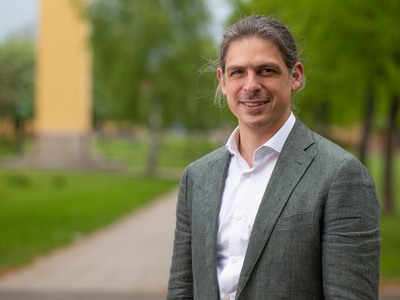Nikolaos Kourentzes is a professor of information technology and predictive analytics at the University of Skövde and one of the world’s most influential researchers, according to a newly published list created by researchers at Stanford University.

Nikolaos Kourentzes, the ice cream-loving professor, eats ice cream all year round. When we ask if this might be the secret to success as a researcher, he immediately sends us a link to an article in The Economist. Ice cream consumption, it seems, has a strong relationship with reading ability, based on the OECD's PISA educational performance scores.
One way to rank researchers is by looking at how often they are cited, meaning how frequently their work is referenced by other researchers. This is a common but debated method for measuring a researcher’s impact. The argument in favour is that influential research is picked up by other researchers and quickly becomes the basis for further innovations and applications.
Once again, Nikolaos Kourentzes appears in Stanford University's annual compilation. This means that, according to this ranking method, he belongs to the top two per cent of the most cited researchers worldwide.
An Acknowledgment of the University of Skövde
"Being on this list of the world’s most cited researchers is an acknowledgement of our research work at the University of Skövde. It’s important to realise that it’s not just about having the most publications, but about the quality of research and its impact on research and practice. We see our ideas being adopted by other research groups and in practice. The University of Skövde maintains a high standard across several areas, and that is something we can be proud of," says Nikolaos Kourentzes.
He explains that the lists attempt to compare research across various fields, as each subject area has its ways of measuring success. In some fields, such as computer science, conference contributions are important, whereas in others, like econometrics and statistics, publishing in journals is key.
Mapping Academic Influence
The compilation is an effort to navigate through all this complexity and provide a ranking of academics across different disciplines to offer some guidance. Nikolaos Kourentzes further explains that the list is a useful tool for understanding which researchers are most influential in various areas. It is particularly valuable for him when he wants to find whose work to read in subjects that lie outside his research areas.
"In the end, the lists reflect the modern landscape of research and innovation. Traditional research superpowers play an important role, especially when large resources are required. At the same time, our relatively young and small university here in Skaraborg is influencing the global direction of predictive modelling. This pattern is repeated worldwide and reflects the diversity and inclusiveness that characterise today’s research. It’s both enjoyable and exciting – you never know when or where the next great idea will emerge!"
More Skövde Researchers on the List
The list also features Antti Revonsuo, a Professor of Cognitive Neuroscience at the University of Skövde. However, as Antti is also employed by University of Turku, and only one affiliation can be linked to the list based on the publication’s chosen method, the University of Skövde does not appear in the statistics.
Read More
See the full list “August 2024 data-update for 'Updated science-wide author databases of standardised citation indicators”.



